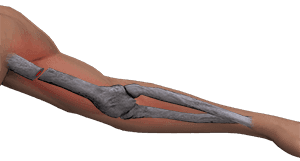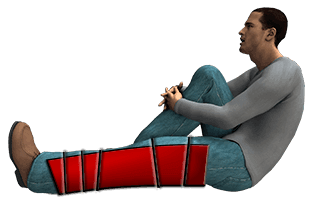Progress
Online First Aid | Bone, Joint & Muscle
Broken Bones and Sprains
Bone, joint, and muscle injuries are common. It isn’t always possible to determine whether or not a bone is broken at a glance; oftentimes, an x-ray is needed.
When dealing with a possible broken bone or sprain, take the following steps:
- ● Make sure that the scene is safe
- ● Get the first aid kit
- ● Put on your PPE
- ● If the person has any open wounds, cover them with a dressing
- ● Place a towel over the injured body part
- ● Place a bag of ice and water on top of the towel
- ● Keep it in place for up to 20 minutes
You should call 9-1-1 if the person has a large open wound, if the injured body part is abnormally bent, or if you aren’t sure what else to do. If the person is still in pain, they should avoid using the injured part of the body until they have it examined by a healthcare provider.

Splinting
A splint is used to stop an injured body part from moving. When a broken bone is bent or showing through the skin, it should not be straightened. If the injured part is bleeding, you should stop the bleeding with direct pressure and a dressing before you apply the splint. Do not attempt to align bones or joints, as this could make things worse. If any broken bones are showing through the skin, cover them with a clean dressing and apply a splint as needed.
Applying a Splint
- ● Make sure the scene is safe
- ● Get the first aid kit
- ● Find an object that can be used to prevent the injured arm or leg from moving
- ● Splints can be made out of rolled-up magazines or towels, pieces of wood- anything that would prevent the body part from moving and sustaining further injury
- ● The splint should be longer than the injured area
- ● The splint should support the joints above and below the injury
- ● Cover broken skin with a clean cloth
- ● Tie or tape the splint to the injured limb so that it is supporting the injured area
- ● Use tape, gauze, or cloth to secure it in place. It should be snug, but not too tight
- ● If the splint is hard, try to pad it with something soft, like clothing or a towel
- ● Keep the limb still

Instructor: Mike Figuero
Publish Date: 2022-04-02
Last Updated: 2022-07-18